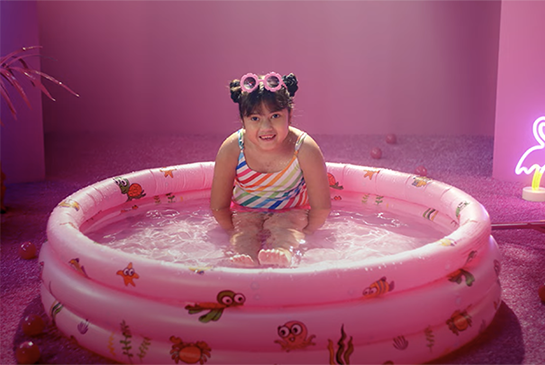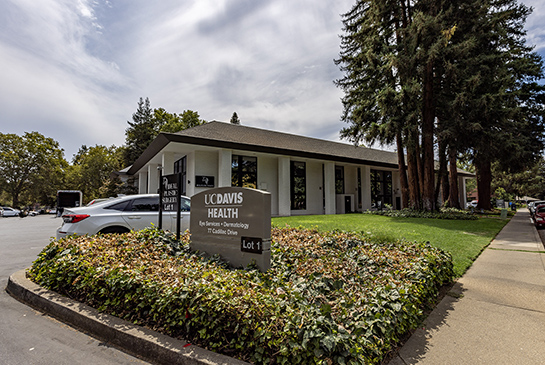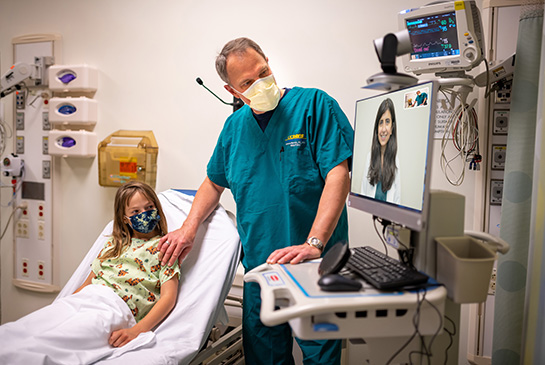Pediatric Heart Center
Services and programs
Families have access to the full-service cardiac care of the Pediatric Heart Center team at UC Davis Children’s Hospital, state-of-the-art technology that can detect heart defects before birth, and the most advanced pediatric heart interventions — all in a child- and family-friendly environment.
-
Cardiac electrophysiology
Pediatric cardiac electrophysiology uses radiofrequency catheter ablation to treat cardiac arrhythmias, disrupting areas of the heart that are the source of the electrical irregularities.
-
Cardiothoracic surgery
Our pediatric cardiothoracic surgeons are experts in performing complex heart surgery and heart repair for a range of congenital heart defects, including total anomalous pulmonary venous return (TAPVR), aortopulmonary window and supravalvular aortic stenosis, hypoplastic left heart syndrome and transposition of the great arteries to name a few.
-
Interventional cardiac catheterization
More about cardiac catheterizationarrow_forwardCardiac catheterization is a non-surgical procedure that is used to both diagnose and treat many heart conditions. Some of the most common pediatric interventional catheterization procedures include closure of atrial septal defects (ASD) or ventricular septal defects (VSD), closure of patent ductus arteriosus (PDA) in neonatal intensive care babies, balloon valvularplasty to repair a number of heart defects and valve replacement procedures.
-
Complex pediatric lipid disorders clinic
Read more about this specialty clinicarrow_forwardOur pediatric lipid disorders clinic provides care for children with abnormal cholesterol levels, elevated triglycerides and lipoprotein (a) levels and other complex lipid disorders, as well as secondary causes of lipid abnormalities, such as diabetes and kidney disease. We diagnose and treat lipid disorders to achieve normal levels through a combination of dietary and lifestyle changes and carefully monitored prescription medications.
-
Melody® Transcatheter Pulmonary Valve (TPV) Therapy
More about Melody® TPV Therapyarrow_forwardUC Davis Children’s Hospital offers transcatheter pulmonary heart valve replacement procedure, a non-surgical alternative to open-heart surgery. Using the Melody® Transcatheter Pulmonary Valve, physicians have a non-surgical means to address pulmonary valve conduit dysfunction. The procedure allows an interventional cardiologist to deliver a replacement valve through a catheter requiring only a small incision, eliminating the immediate need to open the chest and delaying the patient’s next surgical intervention.
-
Pacemaker implantation
Read more about this leading-edge procedurearrow_forwardWe offer implantation of the world’s smallest retrievable leadless pacemaker, called the Aveir VR™, in pediatric patients using a minimally invasive technique. While most traditional pacemakers are surgically implanted through the chest to the outside of the heart, and then connected by leads, this pacemaker is implanted through the child’s internal jugular vein in the Cardiac Catheterization Lab and has no leads. Instead, the heart absorbs it.
The pacemaker is expected to last through childhood and into adulthood, but if the battery needs to be replaced, this retrievable leadless pacemaker will be easy to remove.
-
Pectus deformity correction program
Learn more pectus deformity correctionarrow_forwardOur pediatric heart specialists have expertise in treating chest deformities such as sunken chest, or pectus excavatum, and pectus carinatum, which gives a caved-out or pigeon chest appearance of the chest. Our team of experts have treated chest deformities using traditional cardiothoracic surgery and an investigational method that uses magnets to corrects chest deformity the way braces correct teeth. Surgical options include the Ravitch and Nuss procedures.
-
Cardiac electrophysiology
Learn more about electrophysiologyarrow_forwardIf your child shows signs of having an abnormal heart rhythm (an arrhythmia), staff from our electrophysiology service will evaluate the heart’s electrical system using an electrophysiology study (EPS). Arrhythmias result when the heart’s electrical system functions abnormally or when there is an extra electrical connection or abnormal electrical focus in the heart.
-
Cardiac MRI
Learn more about cardiac MRIsarrow_forwardCardiac MRI is a painless, noninvasive test. We use it to take detailed pictures of your child’s heart so that we can examine the structure and function of the heart and blood vessels. Using Cardiac MRI, we can create three-dimensional images of complex heart defects and measure how well the heart is pumping blood.
-
Diagnostic catheterization
Learn more about diagnostic catheterizationarrow_forwardWe use cardiac catheterization to accurately measure how well your child’s heart is pumping and how much blood is flowing, and to discover any evidence of scar tissue in the heart. We perform diagnostic cardiac catheterization on newborns, infants, children and teens.
-
Echocardiography
Learn more about echocardiographyarrow_forwardDuring an echocardiographic study (a cardiac ultrasound or echo), we use very high frequency sound waves to form a moving, two-dimensional picture of your child’s heart on a television screen. This enables us to identify any abnormalities in the structure of your child’s heart, measure heart muscle function and speed of blood flow, and estimate the blood pressure in different chambers of the heart.
-
Electrocardiography (ECG or EKG)
Learn more about electrocardiographyarrow_forwardAn electrocardiogram or ECG allows us to measure the electrical activity in your child’s heart. We perform an ECG by attaching electrodes (small patches) to your child’s chest, arms and legs and connecting the electrodes to the ECG machine using lead wires. The ECG machine produces a printout or tracing that we examine to see if it varies from a normal tracing.
-
Fetal cardiology and diagnosis of prenatal heart defects
More about fetal cardiology servicesarrow_forwardOur fetal cardiology specialists use state-of-the-art technology that can detect heart defects before the birth of your child as early as 12 weeks gestation. We work with families to provide expert evaluation, diagnosis, management, and counseling of congenital heart defects before babies are born.
-
Cardiopulmonary Exercise Testing (CPET)
Learn more about exercise testingarrow_forwardExercise testing is a valuable noninvasive tool that we use to identify your child’s functional limits and/or or detect heart and/or lung problems. In an exercise test, ECGs are taken while your child exercises on our treadmill or stationary bicycle so that we can see the effects of increasing stress on his heart.
Referrals and appointments
Clinic locations and appointments
Families have access to our full-service Pediatric Heart Center along with the added convenience of six outreach clinic locations.
For referring physicians, please call our patient referrals phone number at 916-734-3456 for assistance with pediatric cardiology services or use on our online referral form.
Pediatric Heart Center - main clinic location
77 Cadillac Drive, Suite 101
Sacramento, CA
Sacramento clinic appointments
Outreach clinics
We have 6 convenient locations in the surrounding communities.




